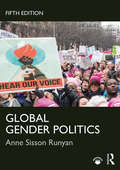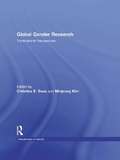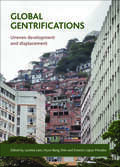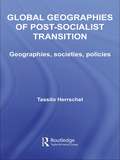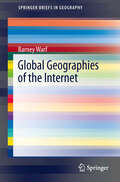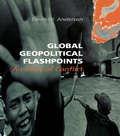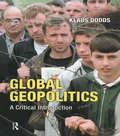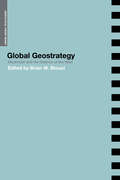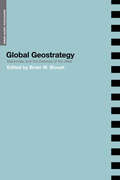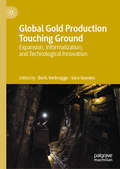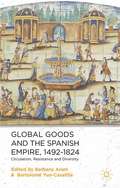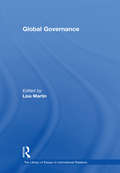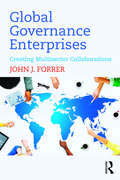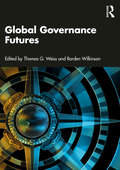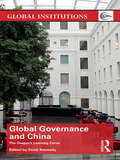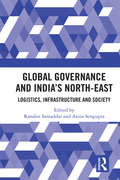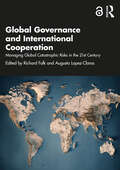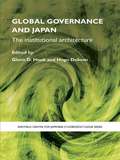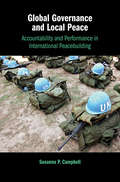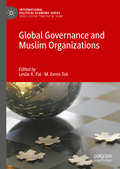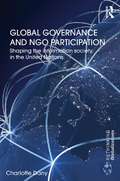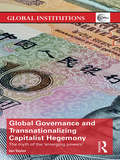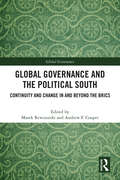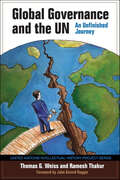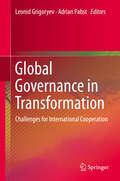- Table View
- List View
Global Gender Politics (Dilemmas In World Politics Ser.)
by Anne Sisson RunyanAccessible and student-friendly, Global Gender Politics analyzes the gendered divisions of power, labor, and resources that contribute to the global crises of representation, violence, and sustainability. The author emphasizes how hard-won attention to gender and other related inequalities in world affairs is simultaneously being jeopardized by new and old authoritarianisms and depoliticized through reducing gender to a binary and a problem-solving tool in global governance. The author examines gendered insecurities produced by the pursuit of international security and gendered injustices in the global political economy and sees promise in transnational struggles for global justice.In this new re-titled edition of a foundational contribution to the field of feminist International Relations, Anne Sisson Runyan continues to examine the challenges of placing inequalities andresisting injustices at the center of global politics scholarship and practice through intersectional and transnational feminist lenses. This more streamlined approach includes more illustrations and discussions have been updated to refl ect current issues. To provide more support to instructors and readers, Global Gender Politics is accompanied by an e-resource, which includes web resources, suggested topics for discussion, and suggested research activities also found in the book.
Global Gender Research: Transnational Perspectives (Perspectives on Gender)
by Christine Bose Minjeong KimReaders of Global Gender Research will learn to compare and contrast feminist concerns globally, gain familiarity with the breadth of gender research, and understand the national contexts that produced it. This volume provides an in-depth comparative picture of the current state of feminist sociological gender and women's studies research in four regions of the world—Africa, Asia, Latin America/the Caribbean, and Europe—as represented by many countries. The introductory essay to each region explains how social science research on women and/or gender issues has been shaped by economics, politics, and culture, and by trends that are simultaneously local, regional, and global. It familiarizes readers with the wide range of salient issues, research methods, writing styles, and leading authors from around the globe. Each regional section includes several chapters on gender research in specific countries that represent the region's diversity and cover the major theoretical and empirical trends that have emerged over time, as well as the relationship of key research questions to feminist activism and women’s or gender studies. Next, the editors illustrate this new wave of gender scholarship with translated/reprinted samples of research articles from additional countries in the region, that cover a wide range of important global topics—such as work, sexuality, masculinities, childcare and family issues, religion, violence, law and gender policies. Finally, this volume provides scholars with extensive bibliographies and a listing of web sites for women’s and gender research centers in 85 countries.
Global Gentrifications: Uneven Development and Displacement
by Loretta Lees, Hyun Bang Shin and Ernesto López-MoralesUnder contemporary capitalism the extraction of value from the built environment has escalated, working in tandem with other urban processes to lay the foundations for the exploitative processes of gentrification world-wide. Global gentrifications: Uneven development and displacement critically assesses and tests the meaning and significance of gentrification in places outside the ‘usual suspects’ of the Global North. Informed by a rich array of case studies from cities in Asia, Latin America, Africa, Southern Europe, and beyond, the book (re)discovers the important generalities and geographical specificities associated with the uneven process of gentrification globally. It highlights intensifying global struggles over urban space and underlines gentrification as a growing and important battleground in the contemporary world. The book will be of value to students and academics, policy makers, planners and community organisations.
Global Geographies of Post-Socialist Transition: Geographies, societies, policies (Routledge Studies in Human Geography)
by Tassilo HerrschelSince the formal raising of the Iron Curtain, there has been much interest in post-socialism and the process of post-socialist transition. This timely book provides a systematic review and analysis of the process of ‘transition’. Herrschel: explores recent theories, concepts and debates on post-socialism and the notion of transition provides a systematic, topical account of post-socialist transitions around the world, as evidence by social, economic, and political processes examines case studies of post-socialist transition in east and Central Europe, the former Soviet Union, Asia and South-East Asia, and Africa and Latin America brings together theoretical and practical aspects by examining what lessons can be learned from recent experiences. Global Geographies of Post-Socialist Transition provides a truly global comparative account of the meaning and processes of post-socialist transition and will be an invaluable resource for all those interested in this area.
Global Geographies of the Internet
by Barney WarfToday, roughly 2 billion people use the internet, and its applications have flourished in number and importance. This volume will examine the growth and geography of the internet from a political economy perspective. Its central motivation is to illustrate that cyberspace does not exist in some aspatial void, but is deeply rooted in national and local political and cultural contexts. Toward that end, it will invoke a few major theorists of cyberspace, but apply their perspectives in terms that are accessible to readers with no familiarity with them. Beyond summaries of the infrastructure that makes the internet possible and global distributions of users, it delves into issues such as the digital divide to emphasize the inequalities that accompany the growth of cyberspace. It also addresses internet censorship, e-commerce, and e-government, issues that have received remarkably little scholarly attention, particularly from a spatial perspective. Throughout, it demonstrates that in cyberspace, place matters, so that no comprehensive understanding of the internet can be achieved without considering how it is embedded within, and in turn changes, local institutional and political contexts. Thus the book rebuts simplistic "death of distance" views or those that assert there is, or can be, a "one-size-fits-all, cookie-cutter" model of the internet applicable to all times and places.
Global Geopolitical Flashpoints: An Atlas of Conflict
by Ewan W. AndersonThis resource describes more than 120 major flashpoints--current and potential conflicts from around the world. The work analyzes each situation, its issues, and present status, and includes specially commissioned maps and extensive bibliographies to aid understanding. Also includes 125 maps.
Global Geopolitics: A Critical Introduction
by Klaus J. DoddsEmploying thematic investigation and illustrated through case studies, Dodds explores how global politics is imagined and practised by countries such as the US and other organisations including Greenpeace, the IMF and CNN International.In addition, the author discusses how issues such as environmental degradation, terror networks, anti-globalisation protests and North-South relations challenge, consolidate and subvert the existing international political system.
Global Geostrategy: Mackinder and the Defence of the West
by Brian W. BlouetThis is a new examination of Halford Mackinder’s seminal global geostrategic work, from the perspective of geography, diplomatic history, political science, international relations, imperial history, and the space age.Mackinder was a man ahead of his time. He foresaw many of the key strategic issues that came to dominate the twentieth century. Until the disintegration of the Soviet Union, western defence strategists feared that one power, or alliance, might come to dominate Eurasia. Admiral Mahan discussed this issue in The Problem of Asia (1900) but Mackinder made the most authoritative statement in "The Geographical Pivot of History" (1904). He argued that in the "closed Heart-Land of Euroasia" was a strategically placed region, with great resources, that if controlled by one force could be the basis of a World Empire. James Kurth, in Foreign Affairs, has commented that it has taken two World Wars and the Cold War to prevent Mackinder’s prophecy becoming reality. In World War I and World War II Germany achieved huge territorial gains at the expense of the Russian empire and the Soviet Union. In the former conflict the Russian empire was defeated by Germany but the western powers insisted that the territorial gains made by Germany, at the treaty of Brest-Litovsk, be given up. In World War II Britain and the US gave material support to Stalin’s totalitarian regime to prevent Nazi Germany gaining control of the territory and resources that might have been a basis for world domination. The west, highly conscious of Mackinder’s dictum (1919) that "Who rules East Europe commands the Heartland," quickly adopted policies to contain the Soviet Union. History has therefore proved Mackinder’s work to be of vital importance to generations of strategic thinking and he remains a key influence in the new millennium.This book will be of great interest to all students and scholars of strategic studies and military history and of geopolitics in particular.
Global Geostrategy: Mackinder and the Defence of the West (Geopolitical Theory)
by Brian W. BlouetThis is a new examination of Halford Mackinder’s seminal global geostrategic work, from the perspective of geography, diplomatic history, political science, international relations, imperial history, and the space age. Mackinder was a man ahead of his time. He foresaw many of the key strategic issues that came to dominate the twentieth century. Until the disintegration of the Soviet Union, western defence strategists feared that one power, or alliance, might come to dominate Eurasia. Admiral Mahan discussed this issue in The Problem of Asia (1900) but Mackinder made the most authoritative statement in "The Geographical Pivot of History" (1904). He argued that in the "closed Heart-Land of Euroasia" was a strategically placed region, with great resources, that if controlled by one force could be the basis of a World Empire. James Kurth, in Foreign Affairs, has commented that it has taken two World Wars and the Cold War to prevent Mackinder’s prophecy becoming reality. In World War I and World War II Germany achieved huge territorial gains at the expense of the Russian empire and the Soviet Union. In the former conflict the Russian empire was defeated by Germany but the western powers insisted that the territorial gains made by Germany, at the treaty of Brest-Litovsk, be given up. In World War II Britain and the US gave material support to Stalin’s totalitarian regime to prevent Nazi Germany gaining control of the territory and resources that might have been a basis for world domination. The west, highly conscious of Mackinder’s dictum (1919) that "Who rules East Europe commands the Heartland," quickly adopted policies to contain the Soviet Union. History has therefore proved Mackinder’s work to be of vital importance to generations of strategic thinking and he remains a key influence in the new millennium. This book will be of great interest to all students and scholars of strategic studies and military history and of geopolitics in particular.
Global Gold Production Touching Ground: Expansion, Informalization, and Technological Innovation
by Sara Geenen Boris VerbruggeIn recent decades, gold mining has moved into increasingly remote corners of the globe. Aside from the expansion of industrial gold mining, many countries have simultaneously witnessed an expansion of labor-intensive and predominantly informal artisanal and small-scale gold mining. Both trends are usually studied in isolation, which contributes to a dominant image of a dual gold mining economy. Counteracting this dominant view, this volume adopts a global perspective, and demonstrates that both industrial gold mining and artisanal and small-scale gold mining are functionally integrated into a global gold production system. It couples an analysis of structural trends in global gold production (expansion, informalization, and technological innovation) to twelve country case studies that detail how global gold production becomes embedded in institutional and ecological structures.
Global Goods and the Spanish Empire, 1492–1824
by Bartolomé Yun-Casalilla Bethany AramDrawing upon economic history, cultural studies, intellectual history and the history of science and medicine, this collection of case studies examines the transatlantic transfer and transformation of goods and ideas, with particular emphasis on their reception in Europe.
Global Governance (The Library of Essays in International Relations)
by Lisa MartinAs economic, social and environmental connections among states have grown stronger and denser in the last decades, new levels and types of governance have emerged. The process of globalization, while not entirely new, has created new challenges for policymakers attempting to reap its benefits and manage its effects. This volume pulls together work on global governance that examines these challenges and looks at the patterns of governance that emerge. The work is organized into six sections. The first introduces concepts crucial to the analysis of global governance, including representation, efficiency, and hierarchy. The next two sections turn to specific patterns of governance in two realms, security and economic affairs respectively. The fourth section examines legal dimensions of governance. The fifth section concentrates on the impact of global governance on domestic politics, while the sixth looks at how concepts of norms and legitimacy structure our understanding of governance. Overall, this collection reveals a rich scholarly understanding of globalization, governance, and institutions that builds on deep theoretical roots while shedding light on major policy issues.
Global Governance Enterprises: Creating Multisector Collaborations
by John J. ForrerGlobal Governance Enterprises focuses on a specific multi-sector collaboration—the formation of an entity that carries out global governance—providing a detailed analysis of the context of their emergence, as well as how they are created, managed, and sustained. Forrer considers the growing challenges to successful global governance and the role of multi-sector collaborations in overcoming these challenges, arguing that such partnerships should be considered successful only when they meet specific conditions that ensure they are “doing well” and “doing good.” By establishing a coherent framework to define global governance enterprises across a wide span of sectors, the book develops a strong theoretical foundation for this type of partnership and provides the reader with an understanding of the practical, operational realities of organizing, financing, and sustaining global governance enterprises. It includes a full section of case studies, ranging from healthcare to environmental organizations, providing practical insight into this form of governance and its function. This book should be on the shelf of any professional or student interested in global governance, public–private partnerships, or public management.
Global Governance Futures
by Thomas G. Weiss Rorden WilkinsonGlobal Governance Futures addresses the crucial importance of thinking through the future of global governance arrangements. It considers the prospects for the governance of world order approaching the middle of the twenty-first century by exploring today’s most pressing and enduring health, social, ecological, economic, and political challenges. Each of the expert contributors considers the drivers of continuity and change within systems of governance and how actors, agents, mechanisms, and resources are and could be mobilized. The aim is not merely to understand state, intergovernmental, and non-state actors. It is also to draw attention to those underappreciated aspects of global governance that push understanding beyond strictures of traditional conceptualizations and offer better insights into the future of world order. The book’s three parts enable readers to appreciate better the sum of forces likely to shape world order in the near and not-so-near future: “Planetary” encompasses changes wrought by continuing human domination of the earth; war; current and future geopolitical, civilizational, and regional contestations; and life in and between urban and non-urban environments. “Divides” includes threats to human rights gains; the plight of migrants; those who have and those who do not; persistent racial, gender, religious, and sexualorientation-based discrimination; and those who govern and those who are governed. “Challenges” involves food and health insecurities; ongoing environmental degradation and species loss; the current and future politics of international assistance and data; and the wrong turns taken in the control of illicit drugs and crime. Designed to engage advanced undergraduate and graduate students in international relations, organization, law, and political economy as well as a general audience, this book invites readers to adopt both a backward- and forward-looking view of global governance. It will spark discussion and debate as to how dystopic futures might be avoided and change agents mobilized.
Global Governance and China: The Dragon’s Learning Curve (Global Institutions)
by Scott KennedyThis volume offers systematic analysis of China’s growing engagement in global governance institutions over the past three decades. During this period, China has gone from outsider to observer to insider. The volume is based on studies of Chinese involvement in a wide cross section of regimes, including trade, finance, intellectual property rights, foreign aid, and climate change. The contributions show that China’s participation in global governance reflects the mutually interactive processes of China’s own socialization into the global community and the simultaneous adaptation of global institutions and actors to China’s growing activism. Both China and the international system are internally complex. Hence, Chinese engagement varies across economic regimes, yielding different results in terms of Chinese compliance, its influence on regimes, and the extent of cooperation and conflict in addressing challenges in international society. The chapters reveal that China is neither purely a savior nor scofflaw of the global economic system, and while China is a defender of the status quo in some areas, it is a reformer in others, and occasionally a revisionist in still other spheres. A detailed analysis of many areas of global governance, this volume will be essential reading for students and scholars of international relations, Chinese studies and global governance.
Global Governance and India’s North-East: Logistics, Infrastructure and Society
by Ranabir Samaddar Anita SenguptaThis book maps the convergence of governance and connectivity within Asia established through the spatial dynamics of trade, capital, conflict, borders and mobility. It situates Indian trade and governance policies within a broader Asian and global context. Focussing on India’s North-East, in particular on India’s Look and Act East Policy, the volume underscores how logistical governance in the region can bring economic and political transformations. It explores the projected development of the North-East into a gateway of transformative cultural interaction among people, just as the Silk Road became a conduit for Buddhism to travel along with musical instruments and tea. Comprehensive and topical, this book will be useful for scholars and researchers of political studies, international relations, governance studies, development studies, international trade and economics and for think tanks working on South and Southeast Asia.
Global Governance and International Cooperation: Managing Global Catastrophic Risks in the 21st Century
by Augusto Lopez-Claros Richard FalkThe Global Governance Forum and the Global Challenges Foundation collaborate in this collection in their concern that the UN Charter and the contemporary infrastructure for international cooperation are no longer fit for purpose and lack the instruments, resources and legitimacy to address the catastrophic risks threatening our future.Twenty-eight contributors offer thoughtful proposals for reforming existing international institutions and creating new ones to build a more peaceful, prosperous and just world, covering themes such as the management of weapons of mass destruction, collective security arrangements, justice and equity in economics, human rights, migration and refugees, climate mitigation, and food security, all bearing on the health of both people and planet.The vital project of this century is building institutions that will underpin global governance in coming decades, requiring imagination, persistence, empathy, and confidence that we will find a path to enhanced mechanisms of binding international law and the resources to make that happen. The volume is essential reading for scholars and researchers on international politics and public policy and indispensable for diplomats and government agencies.
Global Governance and Japan: The Institutional Architecture (The University of Sheffield/Routledge Japanese Studies Series)
by Glenn D. Hook Hugo DobsonLeading specialists from Europe and Japan examine the institutional mechanisms of governance at the global level and provide concrete evidence of the role Japan plays in these institutions. An excellent introduction to the concept of global governance, the volume analyzes how global governance actually works through the global institutional mechanisms of governance. It provides an up-to-date and contemporary analysis of the six most important global institutions, namely: the Group of 7/8 the Organisation for Economic Cooperation and Development the World Bank the International Monetary Fund the World Trade Organization the United Nations. Written clearly and concisely, the book provides a thorough and accessible discussion on Japan’s role within these institutions and uses supporting case studies to ask whether Japan is reactively or proactively involved in trying to shape these institutions in order to promote its own interests. As such, it will be a valuable resource for undergraduates and scholars with an interest in global governance, Japanese politics and political economy.
Global Governance and Local Peace: Accountability And Performance In International Peacebuilding
by Susanna P. CampbellWhy do international peacebuilding organizations sometimes succeed and sometimes fail, even within the same country? Bridging the gaps between the peacekeeping, peacebuilding, and global governance scholarship, this book argues that international peacebuilding organizations repeatedly fail because they are accountable to global actors, not to local institutions or people. International peacebuilding organizations can succeed only when country-based staff bypass existing accountability structures and empower local stakeholders to hold their global organizations accountable for achieving local-level peacebuilding outcomes. In other words, the innovative, if seemingly wayward, actions of individual country-office staff are necessary to improve peacebuilding performance. Using in-depth studies of organizations operating in Burundi over a fifteen-year period, combined with fieldwork in the Democratic Republic of the Congo, Nepal, South Sudan, and Sudan, this book will be of interest to scholars and students of international relations, African studies, and peace and conflict studies as well as policymakers.
Global Governance and Muslim Organizations (International Political Economy Series)
by M. Evren Tok Leslie A. PalThere are 1.6 billion Muslims in the world, represented on the world stage by 57 states, as well as a host of international organizations and associations. This book critically examines the engagement of these states in systems of global governance and with a variety of policy regimes, including climate change, energy, migration, humanitarian aid, international financial institutions, research and education. Chapters explore the dynamics of this engagement, the contributions to global order, the interests pursued and some of the contradictions and tensions within the Islamic world, and between that world and the ‘West’. An in-depth perspective is provided about the traditional and new forms of multilateralism and the policy spaces formed which provide new opportunities for the Muslim and non-Muslim world alike.
Global Governance and NGO Participation: Shaping the information society in the United Nations (Rethinking Globalizations)
by Charlotte DanyThis book explores the limits of NGO influence and the conditions that constrain NGOs when they participate in international negotiations Through an empirically rich study of the UN World Summits on the Information Society (WSIS) this book conceptualizes structural power mechanisms that shape global ICT governance and analyses the impact of NGOs on communication rights, intellectual property rights, financing, and Internet governance. The institutional framework of UN negotiations makes it easy for states to exclude NGOs from crucial meetings and to neglect their most relevant demands, in part explaining why NGOs had only limited influence on the policy outcomes of the WSIS in Geneva 2003 and Tunis 2005, although high numbers of NGOs participated. Using a critical perspective, Dany demonstrates that despite the far-reaching participation rights for civil society actors, structural power mechanisms continued to limit the influence of participating NGOs and this contradicts the widely held assumption that extensive NGO participation necessarily increases NGO influence on the policy outcomes. This book will be of interest to students and scholars of international relations, global governance, the United Nations, and global information and communication politics.
Global Governance and Transnationalizing Capitalist Hegemony: The Myth of the 'Emerging Powers' (Global Institutions)
by Ian TaylorThis book is a critique of claims regarding how emerging economies are supposedly rewriting the rules of global governance and ushering in alternative models to neoliberal orthodoxy. It argues that such assumptions are abstractions that ignore both the transnationalizing nature of the global political economy and the actual policy goals of the ruling classes within most emerging economies. Considering the larger issues behind the emerging economies (or powers) debate, the book deploys an adapted global capitalism perspective with insights from Gramsci, Poulantzas and Cox, to argue that the transnational nature of the global political economy and the actual policy goals of the dominant elites within most emerging economies merge to undermine any transformative element. Far from challenging the global order, these ostensible new rivals in fact seek to integrate their economies more and more within the existing liberal global economy. Inter-state dynamics and even inter-elite tensions exist and it is clear that the nation state has not simply become a transmission belt for global capital, but equally we must move beyond the surface phenomena that are most visible in global tensions to get at the underlying essence of social and class forces in the global political economy. Looking at the largest emerging powers, such as Brazil, Russia, India and China, Taylor explains why the emerging powers’ elites, although essentially subscribing to neoliberalism (in all its variegated forms) may confront the core in a myriad of ways, but that these are not challenges to the ongoing world order and, in fact, the so-called emerging powers serve a legitimizing function for the extant global system. The book will be of great use to graduates and scholars of International Relations, Global/International Political Economy and International Development.
Global Governance and the Political South: Continuity and Change In and Beyond the BRICS (Global Governance)
by Marek Rewizorski Andrew F CooperThis book gives a new compelling meaning to the metaphor of ‘Global South’ against the background of the global political challenge to international order, driven not only through the BRICS grouping, but also by the activities of middle powers striving to alter the political status quo. Expert contributors highlight the interplay between politics, economy, and security, offering insights into how the Global South perceives and responds to pivotal events like the Russian invasion of Ukraine, the COVID-19 pandemic, and the 2008 Financial Crisis. They uncover how non-Western countries interpret and react to these turning points, and explore a diverse array of interests, values, and political behaviours often misunderstood in the West. The volume also examines whether initiatives from the Global South can reshape global governance institutions, influence the existing structures, and provide a historical and philosophical context to understand the continuities and changes in global governance. Ideal for scholars and students, this book is a must-read for anyone interested in the rise and influence of the Global South, BRICS, global governance, and the evolving international system.
Global Governance and the UN: An Unfinished Journey (United Nations Intellectual History Project Series)
by Thomas G. Weiss Ramesh ThakurIn the 21st century, the world is faced with threats of global scale that cannot be confronted without collective action. Although global government as such does not exist, formal and informal institutions, practices, and initiatives—together forming "global governance"—bring a greater measure of predictability, stability, and order to trans-border issues than might be expected. Yet, there are significant gaps between many current global problems and available solutions. Thomas G. Weiss and Ramesh Thakur analyze the UN's role in addressing such knowledge, normative, policy, institutional, and compliance lapses. The UN's relationship to these five global governance gaps is explored through case studies of some of the most burning problems of our age, including terrorism, nuclear proliferation, humanitarian crises, development aid, climate change, human rights, and HIV/AIDS.
Global Governance in Transformation: Challenges for International Cooperation
by Adrian Pabst Leonid GrigoryevThis book analyzes the state of global governance in the current geopolitical environment. It evaluates the main challenges and discusses potential opportunities for compromise in international cooperation. The book’s analysis is based on the universal criteria of global political stability and the UN framework of sustainable development. By examining various global problems, including global economic inequality, legal and political aspects of access to resources, international trade, and climate change, as well as the attendant global economic and political confrontations between key global actors, the book identifies a growing crisis and the pressing need to transform the current system of global governance. In turn, it discusses various instruments, measures and international regulation mechanisms that can foster international cooperation in order to overcome global problems. Addressing a broad range of topics, e.g. the international environmental regime, global financial problems, issues in connection with the energy transition, and the role of BRICS countries in global governance, the book will appeal to scholars in international relations, economics and law, as well as policy-makers in government offices and international organizations.
